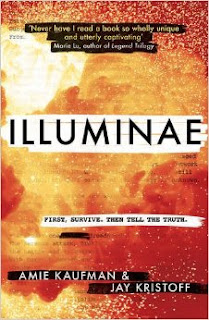Rating: 5/5
Authors: Amie Kaufman & Jay Kristoff
Published: 20th October, 2015
Publisher: Oneworld Publications/Rock The Boat
Hello everyone, it's Shani here, and today I wanted to express my opinions on the book Illuminae by Amie Kaufman and Jay Kristoff.
Illuminae is the first novel in the Illuminae Files trilogy. When I bought this book, I had already heard some amazing things about it - the novel has been praised for its style and narration by numerous other book reviewers, and let you tell me this. This book met every single one of my reading standards, and somehow managed to raise them as well.
Illuminae was my second favourite book that I've read this year. It has one of the most gripping story lines I've ever encountered, hooking you from the very first page, and keeping you on the edge of your seat through out the entire book. Kaufman and Kristoff have presented a YA, sci-fi novel in the least cliche manor possible, and I loved it.
I'm not much of sci-fi reader. I've tried in the past to read many sci-fi books, but I've often found that the plot is too predictable, or that the story is reaccuring. That's not to say that Illuminae's plot is miles different from other sci-fi novels. In fact it isn't. It has all the cliche settings: It's in space, there's fighting, there's an uncontrollable virus that is turning people crazy and reducing them to killing one and other. It's your typical sci-fi novel. What was different was the way it was presented. The book is presented entirely through files, legal documents, chat messages, emails, and security camera footage. I have never found a single author that has formatted their novel this way, and I absolutely applaud Kaufman and Kristoff for experimenting with this style, because it works so well!
The plot, though it involved some typical sci-fi tropes, was fairly original in certain areas. The novel centres around seventeen year old Kady Grant and Ezra Mason who have just escaped from their planet being destroyed by an evil corporation named BioTech. The novel takes place in 2575, yet the authors still manage to keep the novel relevant to their audience, the language they use and the appropriate pop culture references really made me able to relate to the characters in the novel, despite them being thousands of years in the future.
This doesn't start of slowly at all, it throws you straight into action - which was one of the main reasons I adored it so much. I tend to get bored very quickly when reading unless the story really grips me, I tend to find classics hard to get into for example, because the first few pages are normally quite slow, thus I tend to have to force myself to read them just to be able to pursue the rest of it. Illuminae is one of the very few books where I didn't have to do this. I was interested and invested from the very first page, and it was very refreshing!
Another excellent point about Illuminae is the character development. Oh, golly. The character development in this book is incredible. Not only does this book have an incredibly strong, intelligent, and snarky female protagonist, but Kady's character development is wonderful. She endures loss, she makes mistakes, she is presented to the reader as a real person with flaws and I loved this about her.
Illuminae is now in my top ten favourite books that I've ever read, and I'm so excited to read the sequel Gemina, which came out a few months ago!



